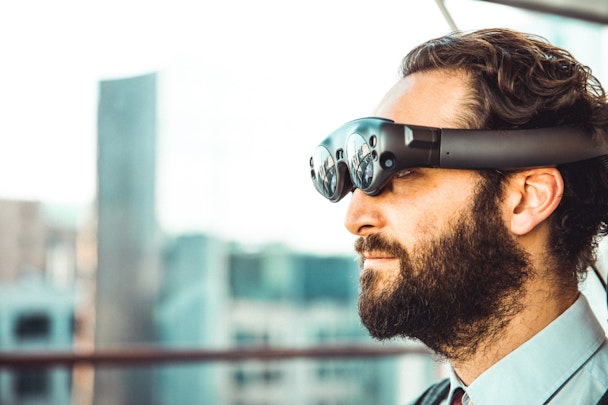Zappar’s Caspar Thykier on augmented reality’s untapped potential: ‘people like reality’
Marketers like shiny new things. Right now, the shiny new thing is the ‘metaverse’: an imaginary behemoth that, despite not yet existing, has somehow subsumed phenomena as diverse as cryptocurrency, massively-multiplayer gaming (MMPG) and augmented reality (AR). We sat down with Caspar Thykier, founder and chief exec of AR specialists Zappar, to talk about AR’s real (rather than imaginary) potential.

Augmented reality expert Caspar Thykier on his route to AR and where it’s headed next / My name is Yanick via Unsplash
Our conversation with AR specialist Caspar Thykier is about AR, not the so-called metaverse. But the metaverse has a way of dominating conversations in 2022, even when the two people talking are skeptics.
“It feels like Groundhog Day,” says Thykier: we’re once again told that we’re on the threshold of revolutionary new technology, ready to bring together disparate developments and change everything.
“My cynical head says it’s a repackaging of these technologies to try and resell them to the VCs (venture capitalists) and investors. It’s an umbrella term that now covers AR, VR (virtual reality), blockchain, NFTs, crypto, web3, [streaming platform] Cloud XR, DAOs (decentralized autonomous organizations) ... all those singular technologies are super interesting. Is there a future where they interoperably create something interesting? Of course. But that’s a long journey. It’s going to take another 10 years for the hardware and the software and the price point and consumers to come to fruition.”
What AR will bring to that party is what it already offers now: “a more immersive way to experience content.” But Thykier is nonplussed by the dream that lurks behind the metaverse’s more radical ambitions – leaving reality behind. “I think people like reality,” he says. “Reality is a good thing. I’m trying to think about how we can not take people away from reality.”
AMV to AR
Thykier’s background is pure adland: he joined AMV as an intern on a university sandwich year, as an anthropology undergraduate, writing a thesis about corporate culture (how departments are organized at an ad agency). He later joined AMV as an account manager, working on Volvo and Guinness. There he rose to the level of new business director and crossed paths with the likes of legendary creative director Walter Campbell, creative duo Dave Dye and Shawn Doyle, and planner Alison Hoad, with whom he would later set up Omnicom-backed agency Campbell Doyle Dye (CDD).
“Everyone in adland at some point in their career feels that they should start their own agency,” he says. “Which is hubris because, yes, you know a fair bit about advertising, but you know bugger all about business.” At CDD, he says, he learned the “business of business”; he later left to join PR shop Freud Communications, joining brother Kris Thykier (who was then vice chairman, but is now a film producer best known for his work with director Matthew Vaughan).
PR, he says, “wasn’t for me”; he left to set up games brand-publisher intermediary Veemee with games developer Kirk Ewing. Ironically enough, Veemee’s work can be seen as an early metaverse predecessor: setting up shops for the sale of virtual goods on PlayStation Home, PlayStation 3’s online hub. It was “a little ahead of its time,” says Thykier; “it was the precursor for everything that’s being talked about now for virtual worlds.” The project was damaged by Sony’s decision not to continue the Home feature for PlayStation 4. “Great lesson there: when you’re totally beholden to a single platform for the entirety of your business, that’s a dangerous place to be.”
From the ashes of that work Zappar was born: Veemee touched on AR, and put Thykier in touch with pioneers in the space: Simon Taylor and Connell Gauld, engineers from the University of Cambridge, with whom he and Ewing would set up Zappar in 2011.
A magic trick
Zappar is now 75 workers strong across three business units: the agency portion; established web AR platform ZapWorks; and fledgling hardware arm ZapBox, which produces a mixed reality (MR) headset (it’s early days, but Thykier says that it will be the most affordable headset of its type on the market).
With specialist agencies and tools popping up, Zappar’s business model has shifted. “It’s quite a blended set of services and tools that our partners tend to want,” says Thykier. “I guess that’s because there are plenty of very good immersive agencies now [that] can create AR content. That’s almost not the difficult thing any more.”
Thykier describes Zappar’s own approach to AR as “rather cynical.” Their job, he says, is to ask, “‘why use this technology?’ It’s easy to say it’s the answer to everything, but it isn’t.”
That doesn’t mean he’s not effusive about its possibilities. First, there’s the reaction that well-implemented AR can have: “It’s like a magic trick, that sense of wonderment and an instant smile on your face.” And with a harder hat on, the marketing power of AR functionality is clear: that power to delight, to make people “lean in,” means that “active engagement, session time and dwell time are incredibly high,” creating average engagement times of, in many cases, “over 60 seconds or even minutes, which is pretty much unheard of for brands.”
But what of that more ambitious dream of AR – of a world persistently overlaid with rich, useful and entertaining information? Metaverse aside, that dream has underlain decades of AR research and development, not to mention failed products such as Google Glass. Why are we not there yet?
Well, it would be nice. But Thykier favors a more grounded approach. “We’re always so enamored by what’s coming next that we forget how brilliant what we can do already is.”
For the latest thinking from industry experts direct into your inbox every other week, sign up to The Drum’s Agency Insights newsletter.
Content created with:

Zappar
Zappar is the world’s leading augmented reality platform and creative studio for mobile and web apps. Since 2011, Zappar’s mission has been to democratise AR...
Find out more
